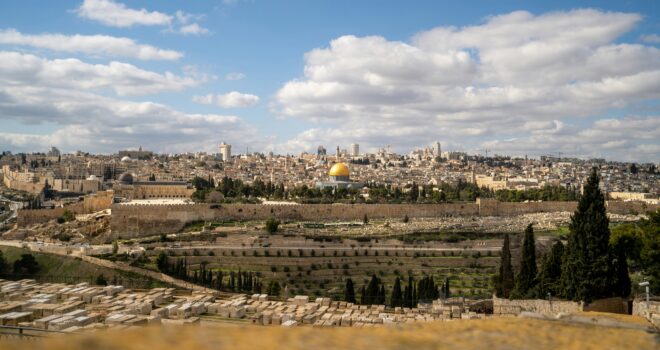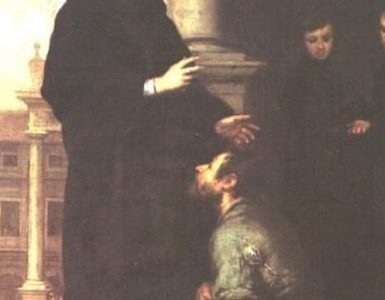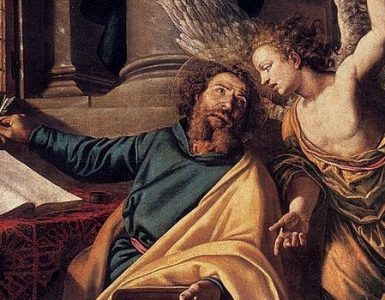Editor’s Note: This is part two of a two-part reflection.
Christ is the Mediator, the Pontifex (literally a “bridge-builder”) between God and Man. He is the Episcopus (literally “watching everything”), the salt of the Earth who gives “taste” and meaning to everything by sacrificing Himself, by “offering” Himself in a holy way (therefore, sacrifice means sacrum facere, to offer something holy) on behalf of others. His is a love that unites, yet distinguishes, those involved. There is a clarity in being and a clarity in action with Christ. He truly reveals to us God and Man, as Gaudium et Spes 22 stresses.
These truths were more and more clear to me as I traveled in the Holy Land, from Jerusalem in Israel-Judea, to Bethlehem in Palestine-Judea, to Nazareth in Galilee. They kept nudging me every time I spoke with a Christian, hearing the suffering he or she underwent in these tense times. However, it is a suffering with deep meaning, a true sacrifice, unlike most of the suffering of meaningless and lack of direction I face in a secular (literally saecula, “of the times”) society like modern-day Europe.
While at first, it was very interesting to witness so much religion with three different expressions of adoration for God, it was also agonizing to have a strong sense of tension, a lack of love. How can veneration of God not bring about love? Such are the suppositions we have as a religion that believes firmly that God is love, Deus caritas est.
During the last Mass I celebrated in Jerusalem, the pieces came together. I was there where Golgotha once was, where the stone that was rejected was the cornerstone, in front of the mosaic of Jesus being put to the Cross on the ground as His Mother looked on, vertically above Him, with sorrow. She represents the sorrows that are not wounds because she accepts all that comes her way for the greater glory of God. She does not resist. Such resistance to the will of God only causes woundedness. She abandons herself to His will. She submits freely to the will of the Father, as does Our Lord who willingly takes on the Cross as the ultimate sacrifice that would unite Man to God and God to Man, to each individual man. The meaning of the Incarnation was there completed before me as I understood its perfection in the Sacrifice on the Cross, a Bridge between everyman and God.
As I ventured to the West Wall to visit the site of the Temple, I sensed that I was entering the territory of another religion. The limits are posted, as they are to enter the space dedicated to the Mosque of Omar. It is here that the meaning of the Incarnation, Death, and Resurrection of Our Lord really make sense because while one senses the separation, the limit, one also senses the lack of unity and love in this context which one who has the Incarnation in mind expects from a religious context.
The Incarnation that unites God to Man and Man to God is all about seeking to unite distinct, but not contradictory, persons. By definition, we learn that a Person is an “individual rational substance” in the works of Boethius on the Trinity. A person, whether Divine, Angelic, or Human, is an individual. A person is not another. Such individual limits are clearly defined by the definition of the divine Person. The Father is not the Son who is not the Father, and so with the Holy Spirit. Who reveals this to us but our Lord Jesus Christ, the Incarnate God-Man? He does so in a hidden way, as we witnessed in Nazareth, a small city where one indeed understands why Nathanael would question Our Lord, “Can anything good come from Nazareth?” (John 1, 46). It did not exhibit anything extraordinary, but so is the nature of grace, a qualitative entity or accident that modifies the substance to which it comes in contact. Grace works like salt. We hardly see it, but it changes the taste of what we eat.
What was most fascinating about the experience in the Holy Land was the timing. It came after the Feasts of the Trinity and of Corpus Domini before the Feast of the Sacred Heart. On one end, I was reflecting on the uniqueness of each Person, of each relation. On the other, I was reflecting on the depths of divine love expressed through the Eucharist and the Sacred Heart, truly the salt of the earth that gives taste to our knowledge of life. Such is the nature of the highest gift of the Holy Spirit, wisdom, “tasty knowledge,” because of the love involved.
To consider that the Sacred Heart appeared in history in 1681, seven years prior to the Glorious Revolution that sent the Stuarts out of the English Monarchy and made England officially Protestant, and one hundred and eight years prior to the French Revolution which would break the bond with the fatherland by killing the head of the fatherland, the anointed Catholic King of France. Only the palpitating love of God, expressed in the sublime depths and breadth of the Sacred Heart we read in the Letter to Ephesians, chapter 3, can save a now very fragmented modern world that willfully ignores its roots, its divine Father, and its direction.
I have taken the subtitle of this short reflection from Donald DeMarco. At one point, Prof. DeMarco writes about fragmentation in an education far too specialized:
Specialization, particularly in scientific and technical pursuits, bears a striking resemblance to the specialization found among animals. Each animal evolved along highly specialized lines of development for the purpose of becoming suitably adapted to specific tasks that help to ensure its survival…The education of the human being, however, is aimed particularly at developing a well-rounded person by supplying him with general and universal knowledge.
Donald de Marco, The Incarnation in a Divided World, p. 56
As one encounters confused individuals in our city streets, one cannot help but find respite in Christ the Savior who is the Mediator between God and Man, Man and God, and Man and Man. Theology, therefore, plays a fundamental role in making the proper distinctions that unite people by giving meaning in Truth, Charity, and Beauty. It is the highest of sciences that united the disciplines in the universities founded in the so-called Middle Ages.
If we do not understand the profound meaning of Revelation and the study of it in Theology, we cannot marvel that wars continue without ceasing. If we do not teach in a form fitting of communion among the disciplines, seeking common ground, we cannot marvel at the growing confusion and hatred that we see on our university campuses. One has but to think of what St. Athanasius wrote in his De Incarnatione. Confronted by the pagan accusation that there is still evil after Christ’s coming, St. Athanasius replied that if He had not come, we would be annihilated. The evil would have destroyed us without Christ.
Our Lord is indeed the cushion that lovingly keeps us from being so separate as to be in hell-like hatred. Our Lord and His teaching of forgiveness, of truth and justice, of magnanimity and of profound virtue, is evidently the solution to our problems today and forever.
Photo by Dariusz Kanclerz on Unsplash










